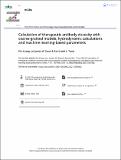Calculation of therapeutic antibody viscosity with coarse-grained models, hydrodynamic calculations and machine learning-based parameters
Author(s)
Lai, Pin-Kuang; Swan, James W; Trout, Bernhardt L
DownloadPublished version (1.946Mb)
Publisher with Creative Commons License
Publisher with Creative Commons License
Creative Commons Attribution
Terms of use
Metadata
Show full item recordAbstract
High viscosity presents a challenge for manufacturing and drug delivery of therapeutic antibodies. The viscosity is determined by protein-protein interactions among many antibodies. Molecular simulation is a promising method to study protein-protein interactions; however, all-atom models do not allow the simulation of multiple molecules, which is necessary to compute viscosity directly. Coarse-grained models, on the other hand can do this. In this work, a 12-bead coarse-grained model based on Swan and coworkers (J. Phys. Chem. B 2018, 122, 2867-2880) was applied to study antibody interactions. Two adjustable parameters related to the short-range interactions on the variable and constant regions were determined by fitting experimental data of 20 IgG1 monoclonal antibodies at 150 mg/mL. The root-mean-square deviation improved from 1 to 0.68, and the correlation coefficient improved from 0.63 to 0.87 compared to that of a previous model that assumed the short-range interactions were the same for all the beads. Our model is also able to calculate the viscosity over a wide range of concentrations without additional parameters. A tabulated viscosity based on our model is provided to facilitate antibody screening in early-stage design.
Date issued
2021Department
Massachusetts Institute of Technology. Department of Chemical EngineeringJournal
mAbs
Publisher
Informa UK Limited